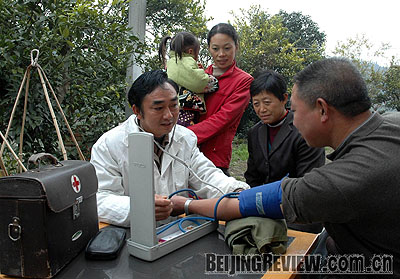|
Rural Medical Time Bomb
According to China's Law on Medical Practitioners, by the year 2011, at least 800,000 village doctors will be disqualified.
|
 |
|
LIFE SAVERS: Although they might not have received regular medical training, rural doctors have been healing China's rural population for decades (LIU BAOPING) | While the law means to standardize doctors' qualifications, the problem is, if these doctors are found to be unqualified, who will replace them in vast rural areas and take care of millions of rural patients?
Working under harsh conditions and with poor equipment, these doctors provide basic medical services to the majority of the people. The practice is hailed by the World Health Organization as an example of rural medical work in less developed countries.
Most village doctors are in their 50s or 60s. Although they have practiced medicine for several decades, most have never obtained relevant academic or professional titles. According to the Law on Medical Practitioners, they will have to quit their jobs before 2011. However, it is unlikely that a large number of university-educated doctors will immediately fill their vacancies due to poor living conditions and low salaries in rural areas, thus putting the lives of many sick people at risk.
Since rural medical conditions are impossible to improve in the short term, the government should set up a qualification assessment system suitable for village doctors instead of dismissing them. They can then continue to serve rural patients. There should also be more fiscal input in these areas, so that rural doctors will also keep upgrading their skills themselves and providing better services.
Dazhong Daily
Sleeper Discount Misdirected
The Ministry of Railways recently announced, from March 15 to June 30, there would be discounts on sleeper tickets, ranging from 20 percent to 50 percent. But the conditions attached seem unreasonable as the discounts are only available for sleepers that are still unoccupied after 6 a.m. on the last day of the journey. How many people want a sleeper in daylight hours?
Whether there is a discount or not, financially well-off people will always take sleepers in overnight trains. For lower-income earners however, even if sleepers are discounted, they will still take hard seats, the lowest class of transport on Chinese railways, to reduce travel costs. Therefore, the sleeper discount may have little attraction to either the rich or the poor.
During the off-season, it is more reasonable for railway departments to lower the prices of hard seats. By doing so, trains will be able to attract some passengers who used to travel on coaches and also help poorer travelers save some money.
Guangzhou Daily
Spammers Need Busting
As the number of cellphone users in China continues to grow, one side effect has been a surge in junk messages.
On March 15, World Consumer Rights Day, the national TV broadcaster CCTV exposed that some provincial units of the country's largest mobile service provider, China Mobile, made big money from selling their subscribers' personal information to senders of junk messages. Cellphone users were undoubtedly victims in this racket.
Many consumers have complained about text spams at relevant government departments. Their efforts are always in vain, because most complaints fail to specify any contravention of laws and regulations due to a lack of relevant stipulations. Consumers are therefore left no choice but to remain silent. Besides, the high legal cost always prevents cellphone users from proceeding further.
Since the source of text spams and the twisted interest chain are already known to the public, it's time to take tangible actions against the spammers so as to prevent cellphone users from further disturbance.
Qianjiang Evening News
Say No to Bleached Flour
For years, China's flour producers have added benzoyl peroxide, a bleaching agent, into their products to make them more appealing to the eye. However, benzoyl peroxide is a strong oxidant, which is harmful to consumers' health. Today, while many health and food experts have been calling for a ban on the use of this toxic chemical in flour production, it is still widely used.
On one hand, Chinese food safety statutes still allow it. On the other hand, producers and distributors say that they have to use the chemical in accordance with state standards because bleaching agent-free flour does not sell well.
In the past, some people falsely believed that the whiter the flour was, the more healthy it was. Up to now, many people still cherish this belief.
While criticizing producers and food watchdogs, we consumers should also ask ourselves: Are we also not to blame for the rampant use of flour-bleaching agents? Why do some of us prefer unhealthy bleached flour?
Consumers are capable enough to reverse the course of producers by refusing to take this flour. This will force producers to make flour without harmful chemicals.
Qilu Evening News | 